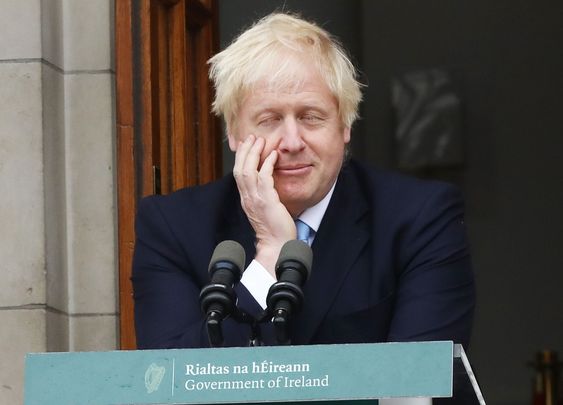British Prime Minister Boris Johnson, like US President Donald Trump, made a bollix of the pandemic and utterly failed his own people concerning the coronavirus crisis with close to 42,000 deaths in the U.K. by Labor Day, second only to Spain in Europe.
*Editor's note: This column appeared in the September 9 edition of the Irish Voice newspaper, sister publication to IrishCentral.
Early this year, shortly after assuming power, Johnson was criticized over his obsession with Brexit and his failure to act quickly on the looming pandemic.
Nine months later, with the virus still impacting tens of thousands of British people, Johnson has once again switched his focus back to Brexit and British withdrawal from Europe.
He and his cadre of old Eton and Oxford chums in government seem as much out of their depth as they did with COVID-19.
Negotiations in Brussels have not been going well as the European Union seeks an agreed withdrawal and the British demand their own set of rules.
The arrogance of the British in the talks has infuriated Michel Barnier, the EU lead negotiator, and he seems likely to be even more at odds with the British following recent events.
Read more: Joe Biden and Riche Neal warn British on Brexit changes
Over the weekend, in a well-coordinated leak, The Financial Times revealed that Britain was seeking to scrap its legally binding agreement reached on the Irish border and were more likely to walk away from any Brexit deal and quit the EU.
Bluff or actual threat? The Irish government, whistling past the graveyard, is desperately hoping it was the former in an attempt to gain more concessions.
Johnson seems in a very hardline mood. The Guardian reports that he “is drawing up legislation that will override the Brexit withdrawal agreement on Northern Ireland, a move that threatens the collapse of crunch talks which the prime minister has said must be completed within five weeks...Johnson now seems likely to walk away with no deal causing a huge crisis on the Irish border.”
According to numerous reports, if no agreement is reached before the deadline, the U.K. will “move on” and accept that a deal cannot be struck, adding that Johnson will say that no deal would be a “good outcome.”
Johnson could not be more wrong. No-deal means the resumption of the hard Irish border, the crunch issue which had been solved last January by a legally binding protocol spelled out in minute detail.
Now the British appear willing to unilaterally override that hard-won deal.
Catherine Barnard, a professor of European law at Cambridge University, told The Guardian, “This is politics over law. I think they are trying to make it clear to the EU that they need to make some movement in the talks and they are using something as sensitive as the Northern Ireland protocol in order to precipitate that. But it is a very high-stakes gamble.”
Not for the first time, the British are using Ireland as a pressure point with the EU with no concern for the consequences.
Let it be clear. A hard border likely leads to a resumption of The Troubles. Are the British going to risk that?
With Johnson, alas, it seems definitely possible.
Read more: Growing support for the assisted dying bill in the Irish parliament




Comments